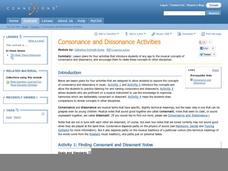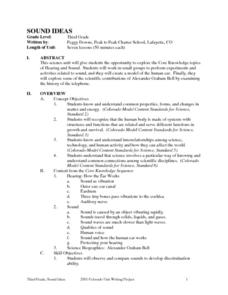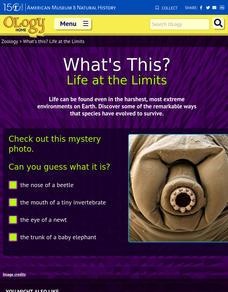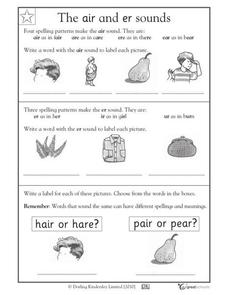Curated OER
Consonance and Dissonance Activities
Hone those musical ears to identify consonance and dissonance in music being played live or on a recording. Learners will work through four activities where they will listen to consonant and dissonant notes being played first by the...
Curated OER
Lesson: Emphasis on Exaggeration
His ears, head, and designs are all an exaggerated form of art. Learners examine a South American sculpture in terms of how exaggeration was used to convey meaning. They then work through the design process as they create similarly...
Curated OER
El cuerpo/ The Body
Donde es la nariz? Distribute a copy of this picture to all of your young Spanish learners to introduce the Spanish words for eyes, nose, and mouth. They cut and paste the images over the words where they belong. Then, to finish, they...
Curated OER
Sound Ideas
Complete a unit of lessons on hearing and sound. Learners conduct sound experiments, research the history of the telephone and scientific contributions of Alexander Graham Bell, and create a model of the human ear.
Curated OER
It's too loud!
Investigate soft, loud, and dangerous sounds. Little ones put a check next to the sounds that are loud, an X next to ones that are soft, and circle the ones that would require protective ear wear. Tip: Get out a tape player or computer...
Explore Sound
Sound and Music
What causes sound? Groups of sound detectives use a variety of tools including ping pong balls, pasta noodles, raisins, rubber mallets, and a tuning fork to investigate what causes sound. The young Sherlocks conduct a series of...
DK Publishing
2 Times Tables
Third graders count, multiply, and color their way to success. Not only do they practice multiplying two by various numbers, they color in a table to fully understand the two-times table, as well as counting sets of two ears on different...
Tinybop
The Human Body
Examine the systems of the human body with a bold, charming, and kid-friendly application. This noteworthy tool is certain to get kids interested what goes on inside of them! The eye feature uses the tablet camera to view images and show...
Math Worksheets Land
Holiday Ratios
Add some holiday cheer to your math lessons with this problem-solving worksheet. From problems comparing the number of ears and legs of Santa's reindeer, to finding the ratio of colored lights on a Christmas tree, a variety of questions...
ESL Kid Stuff
Parts of the Body
Eyes and ears and mouth and nose! Practice the names of body parts with a lesson based on the song "Head, Shoulders, Knees and Toes". Kids sing the song and read a story with the same vocabulary words before finishing a worksheet to...
American Museum of Natural History
What's This? Life at the Limits
There are some amazing ways species evolve to survive. From large ears to sneezing salt, learners read about these interesting adaptations in an interactive lesson. Great to supplement an in-class lesson, it also works well as a remote...
Curated OER
Hear the Wave!
Students study sound and ear function. In this sound functions lesson, students investigate soundwaves by completing various experiments. Students participate in a number of sound stations and complete the comparison chart with their...
Curated OER
When It Comes to Sound, I'm All Ears!
Students discover how sound is produced and how sound travels. Through inquiry, problem solving and hands-on activities, students explore high and low sounds and the mediums in which sound travels best.
Curated OER
Music To My Ears: The District of Columbia Quarter
Students practice identifying different genres of music by creating posters. In this music appreciation lesson, students research Duke Ellington and complete worksheets based on his style of music, Jazz. Students collaborate in small...
Curated OER
Music to Your Ears
Students explore how the sounds made by everyday objects can be transformed into musical experiences, composing and performing musical pieces using non-traditional instruments.
Curated OER
The Ear and Sound words
In this health worksheet, students find the words that are associated with hearing and sounds. The answers are found at the bottom of the page.
Curated OER
Animal Challenge 1
In this animal ears worksheet, students write about how animal's cone shaped ears help them survive. Students write 1 paragraph.
Curated OER
Heating and Cooling a Really Large Lizard
Remind your middle school scientists how fox ear size varies depending on the climate they live in; large ears allow heat loss while small ears keep heat in. Discuss how a cold-blooded animal might try to regulate body temperature. Then...
Curated OER
Vowel Sounds: /air/ and /er/
All the best readers started out the same way. Build the foundational skills needed to recognize vowel sounds like /air/ and /er/. Early readers write a word to label each of nine images. Each image focuses on a different spelling...
Curated OER
Ear Training 8th Graders with Practica Musica
Eighth graders explore how to hear the difference between Major, Minor, Augmented and Diminished chords. They compose a song using two of the four chords. Students compare and contrast the four basic chord types in an effort to increase...
Curated OER
Doubling and Halving
A cute square-headed robot is here to help your class understand doubling and halving. Numbers go in his head and come out his ear doubled. Those same number then go in his ear and come out his head halved. This is a great way to show...
Noyce Foundation
Double Down
Double the dog ears, double the fun. Five problems provide increasing challenges with non-linear growth. Topics include dog ears, family trees and population data, and geometric patterns.
Curated OER
A Wolf by the Ear
Learners examine Thomas Jefferson's complex and contradictory relationship with slavery.
Curated OER
Discussion Questions for Shakespeare's Julius Caeser
Do not let Julius Caesar be Greek to your pupils. Rather, make the play a dish fit for hungry minds. Encourage your class members to lend their ears to a series of rich discussion questions so that they can become masters of the play, as...
Other popular searches
- Ear Diagram
- Ear Parts
- Ear Anatomy
- Human Ear
- Ear Training
- The Ear
- Parts of the Ear
- Ear Structure
- Eyes and Ears
- Ear/ Eer
- Ear Parts: Eardrum
- Physiology of the Ear

























